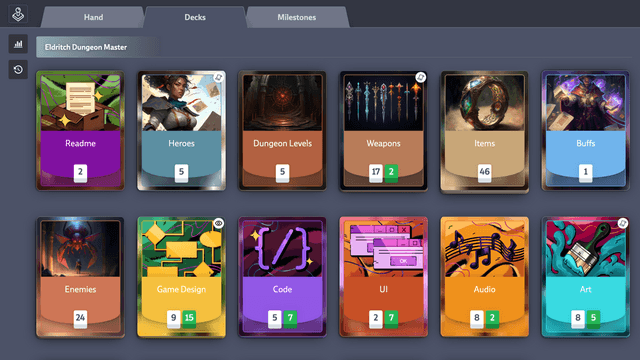
Gonçalo is the Head of Marketing at Codecks. He’s a big Pokémon fan (he has a tiny Bulbasaur right next to his work computer and a big Psyduck in his living room), still raves frequently about how much he loved Shadow of the Colossus (it’s been almost 20 years, Gonçalo!), and truly believes Codecks is *the* tool to turn ideas into videogames.
Codecks is a project management tool inspired by collectible card games. Sounds interesting? Check out our homepage for more information.
Why Project Management is Essential for Indie Game Development Success

Indie game development is an exciting but unpredictable and often chaotic process—there’s tons of creativity, ideas, challenges, and plenty of moving parts. With small teams, tight budgets, and big ideas, indie devs often have to be part artist, part businessperson, and part project manager (and part producer, part writer, and the list goes on…). And even with the most passion and ambition in the world fueling a game, without structure even the most exciting projects can fail. That’s why, as game developers ourselves, we created Codecks, specifically for game development, to make a project management tool better suited to the way game teams actually work and think. Now, in this blog post, we’ll do a deep dive into exactly why project management is essential for indie game developers–and the things good project management can bring.
The Chaos of Indie Game Development
Unlike big studios with entire departments dedicated to keeping things on track, indie teams are usually a handful of people wearing many hats. Artists are running social media, programmers are answering Discord messages, and co-founders are doing bureaucracy work–as developers ourselves, believe us: we know. As indie teams, there are several things we’re constantly battling:
- Limited Resources – Small teams mean everyone is juggling multiple roles, and time is never on your side. A single delay can throw everything off balance.
- Scope Creep – “Just one more feature” is a dangerous game that can turn a six-month project into a six-year odyssey. Games can start as a simple idea and turn into a never-ending project–but fear not, because we’ve also written a blog post all about how to avoid scope creep in game development! Have a read here: How to Avoid Scope Creep in Game Development: Tips and Best Practices.
- Communication Problems – With remote work, part-time contributors, and just not that much time to go around sending messages back and forth, keeping everyone on the same page is a full-time job. Ever had to dig through weeks of chat history to find that one crucial design decision? We have! This is why at Codecks we’ve focused so much on creating features specifically for both documentation (such as doc cards) and collaboration (such as our unique conversations feature), specifically with game development and teams of all sizes in mind. And… we’ve also written about this in another blog post, with tons of tips and best practices! Have a read here: How to Build Better Collaboration in Game Development Teams.
- Deadline Doom – Whether it’s launching in time for an event or securing funding, missing deadlines can mean missing opportunities. Without clear milestones (yes, we have a specific feature for milestones too), it’s easy to drift endlessly.

Why You Need Project Management (Yes, You, Indie Game Developer Reading This Blog Post!)
Project management isn’t just for big studios drowning in Gantt charts—it’s just as essential for indie teams to survive and thrive. A little organization goes a long way in preventing last-minute crunch, scope disasters, and general chaos. Here’s how:
1. Turning Your (Ambitious) Ideas Into (Achievable) Tasks
Breaking a huge game project into smaller, bite-sized tasks makes everything more manageable. Game dev planning tools such as ours help set milestones, delegate tasks, and keep things moving—without needing a wall full of sticky notes.
For example, instead of listing something like “Finish combat system” as a single task, breaking it into specific, achievable goals like “Implement basic attack animation,” “Add hit detection,” and “Balance damage values” makes progress easier to track and execute.
In our years making games we’ve learned how essential this is, and what we need in project management to make it efficien–twhich is why at Codecks we have a unique cards and decks system that keeps tasks visually structured and easy to navigate. Instead of getting lost in endless lists, you can organize work into decks, which makes it simple to prioritize tasks and track progress at a glance.
2. Keeping Scope (and Sanity) in Check
A well-planned project keeps your dream game from ballooning into an impossible monster. Prioritization tools make sure the essentials get done first, while those “nice-to-have” ideas don’t derail progress.
A practical approach is using a Must-Have, Nice-to-Have, and Wishlist system. Instead of letting every idea sneak into your core development timeline, categorize features accordingly. Must-haves are the core mechanics needed to make the game playable. Nice-to-haves are polish or additional mechanics that enhance the experience but aren’t essential. Wishlist items? They can wait for post-launch updates or DLC. We have this on Codecks through our priority feature, where you can assign a priority level to each card—low, medium or high is our default, but you can change it to whatever you want (like the ones we list above, for example).

3. Making Collaboration Less of a Headache
As we mentioned before: Working solo is hard, but so can be working with a team that’s spread across different time zones. Clear project management helps teams collaborate smoothly, ensuring that progress updates, feedback, and task assignments don’t get lost in endless Slack threads or email chains.
For example, if a programmer needs to know which animations are ready for implementation, they shouldn’t have to scroll through chat logs or wait for an artist to respond (in this case specifically, our Dependencies feature would be really helpful…). Instead, a well-managed system ensures that assets and their statuses are clearly documented and accessible.
Indie teams need a system that fits their workflow, making it easy to stay aligned even when working remotely or asynchronously. This is one of the things Codecks was built for.
4. Avoiding Burnout and Crunch Mode
Game development should be (mostly) fun, not a stress-fueled grind. Structured planning prevents the all-too-common indie burnout by setting realistic deadlines and balancing workloads.
Game development has to be sustainable, and you need to implement specific practices to ensure that—such as setting realistic goals based on past development speed instead of just arbitrary deadlines. If it took three weeks to implement a simple quest system, don’t expect a full dialogue system overhaul in one sprint, taking in consideration sprints are, usually, one week).
Using past development patterns to estimate future work helps teams avoid overpromising and underdelivering.
The Right Tools = More Time to Make Games
Let’s be real—no one got into game development because they love spreadsheets. God knows we didn’t, and that’s one of the reasons that drove us to make Codecks—we needed a tool specifically for the indie game development workflow, with a game development mindset in mind. With features like task tracking, milestone setting, real-time collaboration, and our cards and decks system, Codecks keeps your project moving smoothly, so you can spend more time making games instead of managing chaos. And for too long has project management been a necessary evil for game developers–with Codecks, we believe playfulness drives efficiency, so we created a tool that actually makes project management more engaging and fun for you and your entire team.
Conclusion
At the end of the day, creativity is what makes great games—but project management is what makes them finished games. Indie development doesn’t have to be a constant battle against deadlines and scope creep: With the right tools (like Codecks, wink wink) and a solid plan, you can keep the chaos under control and actually ship that game when and in the state you want to.
So… If you’re looking for a project management tool designed specifically for game developers, built around all your specific needs and workflows, give Codecks a try. Studios of all sizes and solo developers (we have more than 50.000 organizations!) use it for a reason—because it helps them stay organized without getting in the way of making games. Sign up for free and see for yourself!